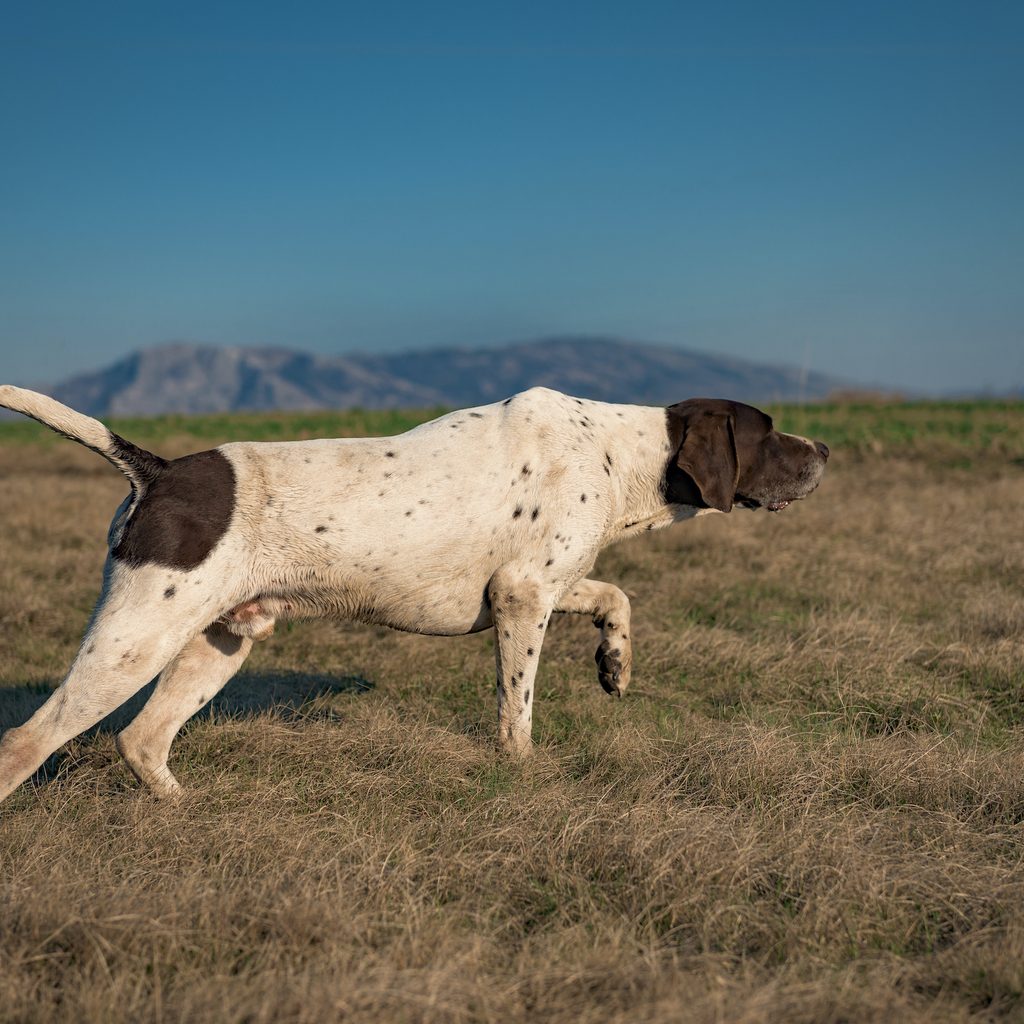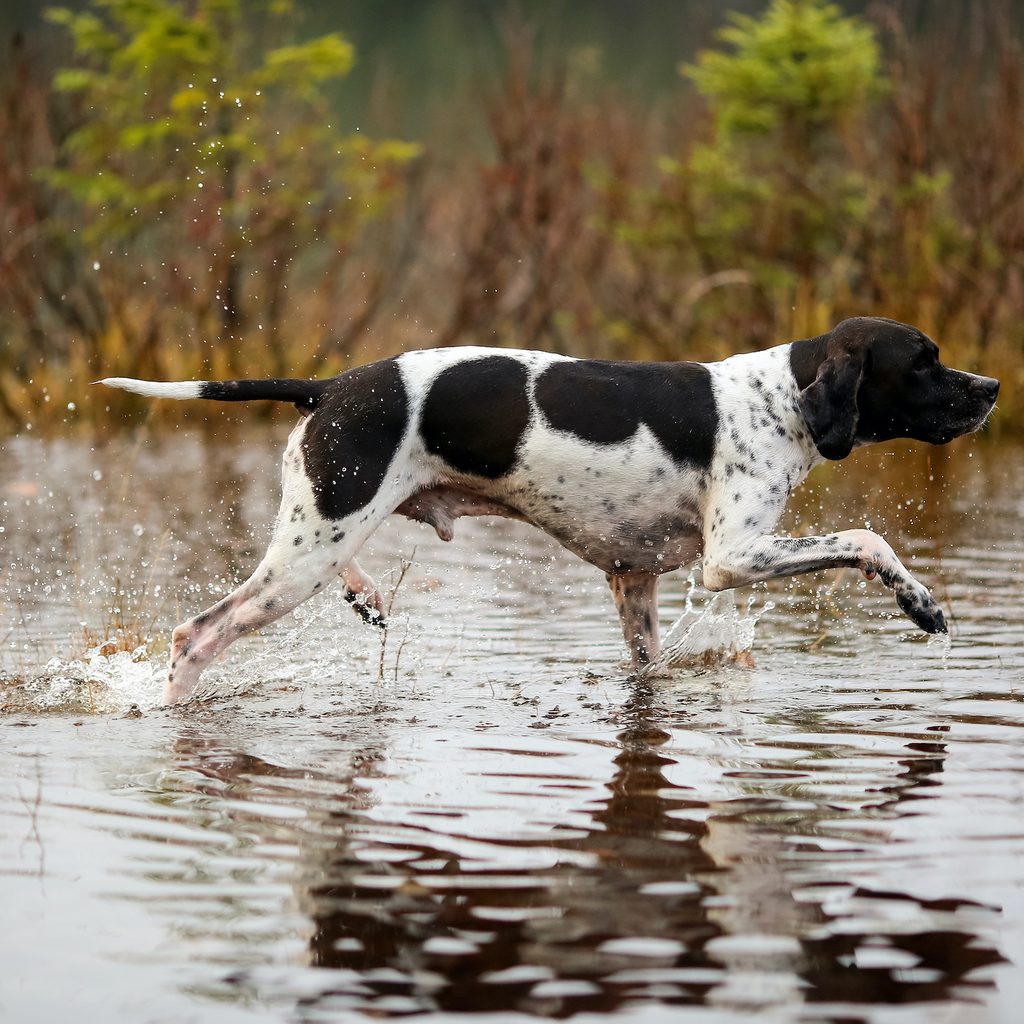Since the early days of human-canine companionship, man and dogs have been hunting together. Many of the modern sporting breeds we know and love — including Pointers — were bred exactly for this purpose, but not everyone knows much else about them. How many types of pointer dogs are there? What sets them apart from one another?
This group of dogs is named after their characteristic “pointing” behavior. When dogs point, they freeze in place with one paw lifted and their nose facing a certain direction. This is meant to tell their hunting partner where to look, though dogs often point when they find something interesting. Some breeds were developed specifically for this behavior, though any dog can point.
How many types of pointer dogs are there?
Before you can get a definitive answer, it’s important to narrow down what exactly “pointer” means to you. This description can refer to a group of dogs, known as the Pointing Breeds, who all descend from a few ancient hunting dogs — the true pointers. Though the rest of the Pointing Breeds retain their natural hunting and pointing instinct that makes them so famous, most of these descendants dropped the word from their breed’s name. Keep reading to find out what breeds these are — you may be surprised.
The very first English breed to find and point game is first descended from the now-extinct Old Spanish Pointer and the English Foxhound (via American Kennel Club). This is the English Pointer, which is known simply as the Pointer today. The Old Spanish Pointer was also bred for hunting in Germany; the German Shorthaired Pointer resulted as a cross between this breed and the Bloodhound. Their wire-haired cousin developed a bit later as a cross of multiple breeds, but they also make talented gaming companions.
The English Pointer and its German cousins are the “true” pointer breeds. Still, the descendants of these breeds still have their gaming instincts and are part of the AKC-recognized pointer breeds.

What breed is a pointer dog?
As listed by the American Kennel Club, dogs that belong to the Pointer group include:
- English Pointer
- Germain Shorthaired Pointer
- German Wire-haired Pointer
- Wire-haired Pointed Griffon
- Weimaraner
- Vizsla
- Spinone Italiano
- Brittany
- English Setter
Many are surprised to learn just how many types of pointers there are, and how different each breed is from one another. Of course, these aren’t even the only dogs who have pointing instincts — any dog may lift a paw when focusing on an interesting sight, smell, or sound.
Are pointers good family dogs?
With a description like “loyal, hardworking, [and] even-tempered”, it’s hard to imagine the pointer being a difficult family dog. Despite their love for work and hunting, they’re just as happy to play and exercise with their people. At the same time, Pointers can be independent and a bit stubborn, so patience is necessary too (via Hill’s Pet). If you enjoy sponging time in the outdoors and don’t mind letting your dog have some “me-time”, this breed may be a great fit for your home.
The German Pointer breeds tend to be more affectionate with family, though still is not an ideal companion for toddlers and young children who don’t know boundaries around dogs. They are just as smart as other pointing breeds and will need lots of physical and mental stimulation to thrive.
According to the American Kennel Club, the Weimaraner is a patient, vigilant, yet gentle breed of pointer. They are more likely to get along well with kids but can be more of a watchdog than other pointers. These Gray Ghosts are easy to train, easy to groom, and even easier to get along with.
The Hungarian Viszla has a wonderful balance of energy and love. They’re gentle and friendly with loved ones yet ready to play and exercise at a moment’s notice (via AKC). As a general rule of thumb, all pointing breeds enjoy lots of exercise and mental stimulation, even if it’s not the hunting job they were bred for.

What is the best pointer dog?
Though there is no singular “best” pointing dog, it’s very possible that there’s a best breed for your home. Whether or not you have your eye on one breed in particular, it’s worth looking into all related breeds inches you find one better suited to your lifestyle. Of course, the breed isn’t everything, either. Every dog has a unique personality, so you never know just how similar or different from their breed they could be.
All in all, pointing breeds make excellent family companions for people who love to be active or spend time outside. Whether or not you’re open to hunting—or even simulated hunting to satisfy your dog’s instincts—there are plenty of ways you and your pup can spend time together and tire each other out. These dogs just may be the ultimate adventure buddies.




